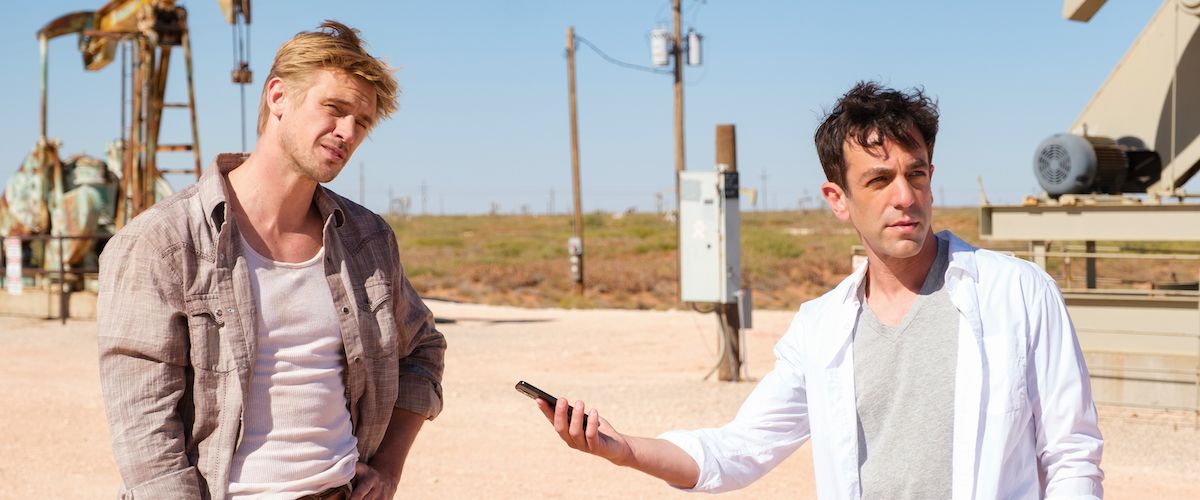By Jonah Naplan
August 2, 2022

Vengeance
Review: B.J. Novak's commentary on stereotypes is darkly funny and also just plain dark.

By Jonah Naplan
August 2, 2022

“Vengeance” is the kind of movie that I wish more people would see. For one, that would account for greater potential in discussing the movie’s true meaning. The film says a lot about the culture of our country, and what we assume as a society. It’s about stereotypes, and the associations we, as Americans, begin to form about certain states and groups of people. In this case, Texans. Not one group or individual is safe in this thought-provoking movie. It breaks down the characteristics of both Conservatives and Liberals, flipping what we thought we knew on its head. It’s sometimes perplexing, but never uninspired. People may disagree on the movie, and that’s why it’s so prone to be broken apart and discussed. But also because of its imperfections.
“Vengeance” stars B.J. Novak, who also wrote, directed, and executive produced the film. This is his baby. And for the first forty to forty-five minutes, it feels that way. The first act of this film is laugh-out-loud hilarious, and works swimmingly with a brilliant script from the star of the movie himself. Novak clearly feels comfortable delivering smart quips as the unlikely hero, Ben Manalowitz, likely because he wrote them himself. Ben is a podcaster and journalist from New York City (a very different state from Texas) who finds himself investigating the murder of Abilene Shaw, a past lover, alongside the young woman’s brother Ty (Boyd Holbrook). Ben isn’t really supposed to be here. He only got himself wound into this situation in the first place after getting invited to Abilene’s funeral by her family, all of whom assume that Ben had a much more intimate relationship with Abilene back in the day than he actually did—this makes for some of the movie’s funniest scenes. When we first meet the Shaws, they seem like a “stereotypical” Conservative family. But the word “stereotypical” gets thrown around quite a lot in this movie, so an inference at the beginning of the film means close to nothing.
Ben is coordinating back and forth with his partner Eloise (Issa Rae), who encourages him to begin recording the conversations he has with Abilene’s family, and locals in the Abilene city. (Yes, Abilene is also the name of the place most of this movie takes place). Everyone that Ben meets believes that Abilene was murdered, even though Ben and Eloise think that’s absolutely ridiculous. Either way, the passion that these locals have when speaking of this “murder,” as well as their collective political views, is seen by Eloise as great “juicy” content for her podcast. So Ben ends up with tons of recorded material, that he then follows with profound monologues he records in the nighttime.
Novak is terrific in the film, and so is pretty much everyone else. The Shaw family comes off at first as not being the most intelligent people in the country, but that actually makes them more endearing. For the first half of the movie, we see the story through Ben’s eyes, and therefore a hint of cynicism can be found in the first few Texas scenes. But the movie is more than that. It evolves beyond the tropes of this kind of genre. And fortunately so.
The way the Texans speak may hit you differently depending on your background and the place you live. If you come from a place like Brooklyn, the Southern language that the Texans use may come as second nature to you. But I live in Arizona, a state that’s been classified as red for many years. (Although, last election we just barely became Liberal). I’ve become more accustomed to people with that Southern drawl in my everyday life, and many of the gun-obsessed people that Ben meets on his journey in many ways emulate that. However, as the movie progresses, we begin to learn more and more details about the Texan family we’re watching, and it suddenly becomes more and more clear that there’s more to them even on a surface level. The movie doesn’t take any specific side, rather it instead makes a Liberal New Yorker come to terms and find common ground with people that seem so drastically different from him. Maybe they’re right about Abilene being murdered. Maybe this whole podcast thing has ended up being a hoax. We can’t know for sure until the film’s conclusion.
But about said conclusion. For a movie that for two-thirds of its runtime is so unique and funny, a serious ending that is devoid of any humor and is actually pretty dark, seems pretty out of the ordinary, to say the least. I didn’t really like it. For a while, the movie has a nice balance. It’s often hilarious, while still maintaining an important baseline premise about an apparent murder. But at a certain point, the movie drops the humor, and stops being funny entirely. It decides to focus exclusively on the murder and the connection it has to Quinten Sellers (Ashton Kutcher—man, we haven’t seen him in a while). For B.J. Novak, a man of comedy and sincere intelligence, making a conclusion, feral to that degree, sometimes feels distasteful. If we aren’t leaving the theater, shook by what we just witnessed, something’s likely wrong.
Luckily, the movie’s lackluster conclusion is not what I’ll remember it by. I’ll remember it by the clever dialogue and the ever-so-important social commentary it acknowledges. By the time we get to the end of the movie, it sometimes feels like we, as audience members, understand what Novak was trying to say. But most importantly, we understand that we need an additional perspective to fully understand the bigger picture. That’s what Novak realizes in “Vengeance.” My political views don’t line up with most Texans, but I can certainly admit that the Shaws are not your stereotypical Conservative family.
"Vengeance" is rated R for language and brief violence. It's 107 minutes.
JONAHtheCRITIC.com